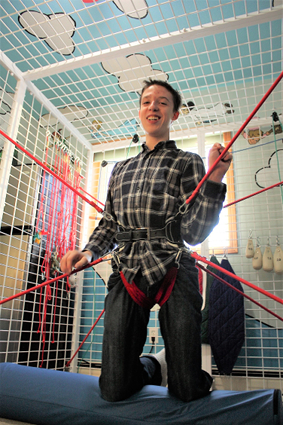 This model for intervention is based on athletic training and is frequently used in ABA (Applied Behavioral Analysis) interventions. In the traditional therapy model, therapists attempt to reach certain goals in an hour treatment session 1-3 times a week. Conversely, in the intensive model, a child doesn’t get the chance to completely recuperate before having to “go again.” Children participate in 3 hour sessions, every day (M-F) for 3 weeks at a time, 2-4 times in a year. This type of intervention allows children and their therapists the opportunity to build on yesterday’s learning without having to start over from the beginning.
This model for intervention is based on athletic training and is frequently used in ABA (Applied Behavioral Analysis) interventions. In the traditional therapy model, therapists attempt to reach certain goals in an hour treatment session 1-3 times a week. Conversely, in the intensive model, a child doesn’t get the chance to completely recuperate before having to “go again.” Children participate in 3 hour sessions, every day (M-F) for 3 weeks at a time, 2-4 times in a year. This type of intervention allows children and their therapists the opportunity to build on yesterday’s learning without having to start over from the beginning.
Benefits of intensive therapy:
- Fast progress.
- The child can build on gains made daily and achieve the next level of function.
- Good option to use when a child has reached a plateau in traditional therapy, or after another intervention has been used (eg, Botox injections, serial casting) to maximize a child’s newly acquired range of motion.
- The opportunity to participate in other extracurricular activities and practice the skills they have acquired in the clinic, without the interference of therapy sessions every week.
- The clinic features a wide variety of equipment and therapeutic materials designed to help your child achieve their goals in a fun and exciting way!
- Since adopting this model, we are able to discharge children with sensori-motor challenges within a year!
At Hands on Therapy, we supplement the progress made in the clinic’s intensive sessions with home-based interventions. Our home-based therapists can easily assure that the most appropriate, functionally supportive equipment and adaptive strategies are used by your family.
- Improved follow-through is noted with exercises and daily activities, as your family takes an active role in progressing your child’s development and in providing the best home environment available for your child. When the family is “on-board,” maximal independent functioning is achievable!
- Caregiver empowerment – Caregiver education regarding the child’s unique therapy requirements takes place within the family’s routine and incorporates the family’s own resources. They are taught to monitor and report change, which helps make therapy more meaningful and promotes involvement, understanding, and acceptance.
- Allows for a collaborative approach to provide the most comprehensive support for families. We work closely with daycare centers, home health nursing agencies, and other medical specialists involved in the child’s care.
- Transportation stressors are eliminated.
- Suggestions are given to make your daily routine as therapeutic as possible. Hands On therapists are passionate about helping families find joy in the journey of raising your children!